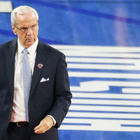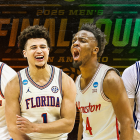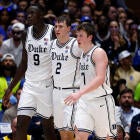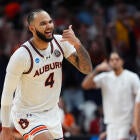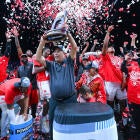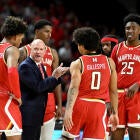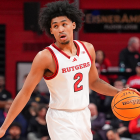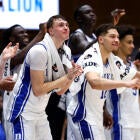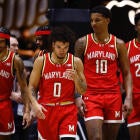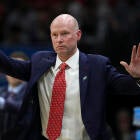Did we just witness the height of North Carolina arrogance backfire? Given the unpredictable turns in the school's academic fraud case, it's impossible to say for sure. But it's a fair question given how tough the NCAA's third notice of allegations is to the Tar Heels.
UNC got a gift-wrapped present in April from the second notice of allegations, when the NCAA removed any mention of football and men's basketball related to the school's fake classes. UNC's women's basketball program absorbed all of the specific allegations and looked like Jerry Tarkanian's old statement about Kentucky and Cleveland State: "The NCAA is so mad at North Carolina's academic misconduct by everyone that it will probably slap another two-year probation on the women's basketball team."
Maybe the NCAA Committee on Infractions (COI) would have bought those second allegations. Maybe not.
But UNC couldn't leave well enough alone. So the Tar Heels argued with a straight face that the worst academic fraud scandal in college sports history isn't subject to NCAA jurisdiction. To follow that argument to a logical conclusion, the NCAA then shouldn't be involved in academics at all.
There's a reasonable debate to be had over that exact issue. But the COI hearing panel, led by SEC commissioner Greg Sankey (a huge proponent of NCAA amateurism), was never going to buy that. This case, as the COI panel wrote to North Carolina in late November, "appears to implicate issues at the very core of the Collegiate Model."
So here we are Thursday with the third notice of allegations.
This latest notice contains the tough allegations a lot of us expected to see from the start. The COI panel basically took control and directed the NCAA enforcement staff to write the allegations as we've all known them for a while and made them more in line with the first notice from May 2015.
Football and men's basketball are squarely back in the picture for penalties.
"Many at-risk student-athletes, particularly in the sports of football and men's basketball, used these courses for purposes of ensuring their continuing NCAA academic eligibility," the latest notice said.
The Tar Heels' 2005 NCAA championship, which involved players who took many fake classes, is squarely back in play to be vacated. The latest notice expanded the time frame for the violations and now looks at fall 2002 until summer 2011. The second notice alleged the violations ran from fall 2005 to summer 2011, neatly preserving UNC's national title in spring 2005.
The NCAA has added a charge of unethical conduct and providing extra benefits against Deborah Crowder and Julius Nyang'oro, who created the fake class scheme. UNC's athletic department "leveraged the relationship with Crowder and Nyang'oro to obtain special arrangements for student-athletes in violation of extra-benefit legislation," the notice said.
"The Committee on Infractions is acting as the investigator, the prosecutor and the judge, and I think it's inappropriate," North Carolina athletic director Bubba Cunningham complained Thursday.
Cunningham is upset the process is changing midstream. But when hasn't this case changed midstream over the past decade? And what role does North Carolina play in that process that it's trying to make us forget?
Once again, there are so many games in so many sports that could be vacated at North Carolina. It's hard to comprehend how much of UNC's sports history since 2002 could vanish from the record books and be accompanied by other penalties moving forward.
So why did UNC even challenge the NCAA's jurisdiction in the second notice?
"We felt compelled to put the jurisdictional issues in there should the final outcome not be consistent with case precedent or any of the other bylaws that we feel are appropriate," Cunningham said. "I don't know what the remedies would be if you're punished beyond the existing bylaws. We put that in there to maintain all of our opportunities following the conclusion of the NCAA case."
North Carolina is complaining that the infractions committee overstepped its bounds. "You can't chase things just because you have an opinion," Cunningham said. "You've got to follow the bylaws."
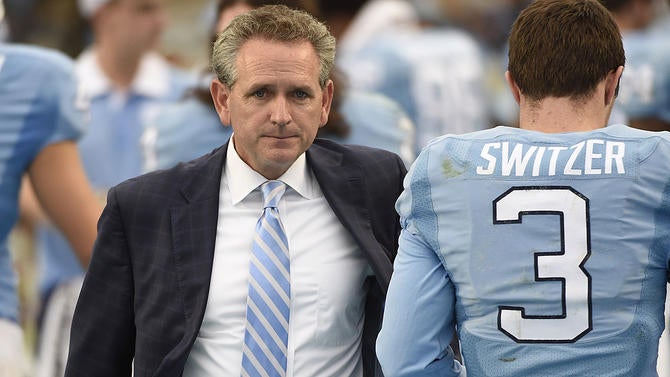
UNC previously said the NCAA knew back in 2011 that the courses in question had irregular class meeting times, lacked professor oversight and included grading irregularities. Back then, the NCAA seemed to allow UNC to get away with the argument that non-athletes took these fake classes too and thus it wasn't an NCAA issue.
The NCAA clearly botched the early investigation. But reporting by Dan Kane of the Raleigh News & Observer also showedit's clear that North Carolina for a long time didn't want to know how deep this went and failed to do a proper investigation.
If everyone buries their head in the sand and the facts keep coming out, eventually the day of reckoning arrives when you've got to come up for air. Finally, UNC commissioned a real report by attorney Kenneth Wainstein, who showed in 2014 how deep the fake classes went over a period of 18 years. The NCAA had no choice but to reinvestigate, except it's never been comfortable looking at the academic rigor of university classes. (Never mind that the NCAA looks at the academic rigor of high school classes on the front end for recruits.)
In a letter to UNC, the COI hearing panel acknowledged that NCAA bylaws "do not generally contemplate the infractions process addressing quality and content assessments regarding academic courses." But, the COI said, NCAA members have recognized an "appropriate space" for the infractions process to address cases involving university officials improperly influencing athletes' eligibility or academic performance.
So what caused NCAA Notice No. 1 to get a lot better for UNC in NCAA Notice No. 2? According to the COI, there was confusion between the NCAA enforcement staff (which investigates and makes the allegations) and the COI (which decides the penalties after reviewing the allegations and holding a hearing).
"The change appears to have been based, in part, on a belief by the enforcement staff that the COI does not generally support the consideration of impermissible academic assistance allegations," the COI panel wrote to UNC. "That is not an accurate characterization of the COI's position. The COI will consider allegations of violations of NCAA rules, including those involving impermissible academic assistance and academic misconduct, when the facts are present to support such allegations. The COI does not support impermissible academic assistance allegations that appear to constitute academic misconduct. The COI has never intended to suggest that appropriately framed academic allegations (i.e., impermissible academic assistance or academic misconduct) should not be presented to the COI."
If this is confusing, inside-baseball jargon to you, well, it is. Billable hours are always the big winner in big NCAA cases like this.
The NCAA reinserting itself with tough allegations is ironic to retired North Carolina Supreme Court Justice Bob Orr. He was co-counsel in a lawsuit against the NCAA and North Carolina over the school's fake classes that disproportionately involved athletes. In August, right after the second UNC notice was released, the NCAA got itself dismissed from Orr's lawsuit. (UNC is still waiting on a decision for its motion to dismiss.) The judge ruled that Orr's side, which represented two former UNC athletes, failed to state specific claims of how the NCAA had a legal duty to protect the players from bogus classes.
"It goes to the hypocrisy of the NCAA," Orr said. "The NCAA wants to have it both ways. They want to say we don't have any academic responsibility for what's going on, but this case is all about academic responsibility. I think everybody at the NCAA and UNC would like for this to go away. They just don't know how to make it go away."
Orr believes UNC is correct that the NCAA had enough information in 2011 to know something was significantly wrong and looked the other way in a process with very little public transparency. He even suggests UNC join his side and sue the NCAA by arguing this infractions case shows how involved the association is with academics.
"I've said all along UNC would have been far better to do a mea culpa from the beginning and say, 'This is horrible, but we weren't doing anything malicious; we were just playing the college sports game to keep kids eligible and we understand these kids are getting shortchanged academically and we'll be at the forefront of reform,'" Orr said. "But they've never really been able to do that."
Don't rule out a lawsuit by UNC against the NCAA. Cunningham offered veiled threats and suggested the NCAA's decision to use all of Wainstein's report -- including the conclusions -- is similar to how the association used the Louis Freeh report in the Penn State case. The NCAA got sued and rolled back some of Penn State's penalties.
"I've seen recently the NCAA has chased after some other schools and gone outside their own process," Cunningham said. "That hasn't worked out very well and I don't want them to do that again."
The difference: Penn State involved heinous crimes of child abuse outside the NCAA; North Carolina involves academic misconduct issues that are inside the NCAA (well, depending on the day of the week).
So the soap opera "As The Tar Heels Turn" continues. There's posturing back and forth and more bad news for UNC and no end in sight, just high stakes for both sides.
For UNC, there's the 2005 national title to preserve and the potential of serious scholarship penalties to avoid. For the NCAA, there's amateurism to preserve, interest by other NCAA members about fair play, and a potential challenge (again!) to the NCAA's infractions process.
"I did have one goal and I'm going to change it," Tar Heels basketball coach Roy Williams told reporters Wednesday when news of the latest notice broke. "I'd hoped that the NCAA thing would be over before I'm retired. And now I'm hoping it will be over before I die."
Rest in peace? The NCAA and UNC can only wish.
![[object Object] Logo](https://sportshub.cbsistatic.com/i/2020/04/22/e9ceb731-8b3f-4c60-98fe-090ab66a2997/screen-shot-2020-04-22-at-11-04-56-am.png)








